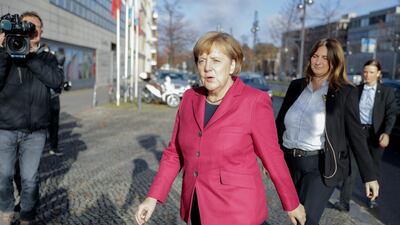German chancellor Angela Merkel continued discussions on Friday about forming a four-party government after all-night talks with potential coalition partners produced momentum without resolving key differences.
Seeking to avert a crisis that would threaten her fourth term, Ms Merkel and her Christian Democrat-led bloc (CDU/CSU) continued discussions with the Free Democrats (FDP) and the Green party. After the chancellor initially set an informal Thursday deadline to wrap up a month of exploratory talks and move forward to concrete coalition negotiations, officials said several more days may be needed.
“It isn’t easy,” Ms Merkel told reporters in Berlin as she arrived for what she called round two. “We raised a host of very, very detailed topics in the exploratory talks, and so it’s not going to be entirely straightforward to tie the loose ends together.”
Senior FDP official Wolfgang Kubicki told ARD television the parties remained “far apart” on issues including immigration, climate change, fiscal policy and internal security.
“I’m struggling to see how we’ll reach an agreement quickly,” Mr Kubicki said. “There’s always the suspicion that you’re being taken advantage of, which is not a good basis for compromise.”
His party colleague Nicola Beer told Deutschlandfunk radio: “I still have hope, precisely because we’re now going into overtime, that everyone will take the opportunity to think again about getting a pragmatic solution that will move the country forward.”
Discord over sharing financial risks in the euro area, cutting carbon emissions and limiting immigration have hamstrung Ms Merkel, Europe’s longest-serving leader, who won a fourth term in September but is stuck with a caretaker government. Even a deal to move ahead now would be only an intermediate step, followed by detailed talks on a policy blueprint for the next four years.
Germany’s domestic conflicts, which reflect an increasingly splintered political landscape, are playing out on the global stage. Merkel has put euro-area policy on hold until there’s a new government. At a United Nations climate conference in Bonn this week, she flagged Green-led demands for curbing coal as a point of dispute in coalition talks.
Limiting the appetite for conflict on all sides is the risk of a repeat election if the talks collapse. Merkel’s bloc won in September with its lowest share of the vote since 1949, while the anti-immigration Alternative for Germany party (AfD), which campaigned against Merkel and the rest of the political establishment, entered parliament with 12.6 percent.

